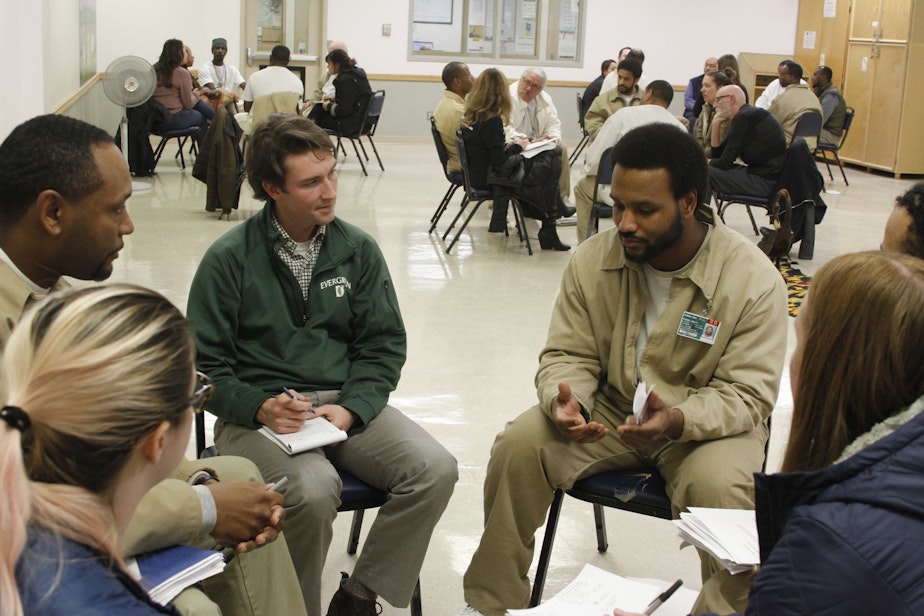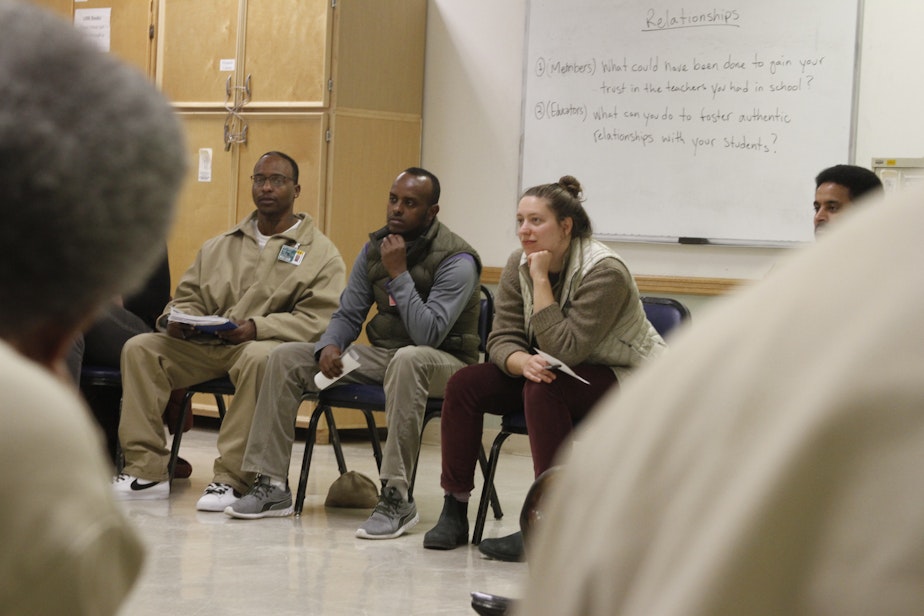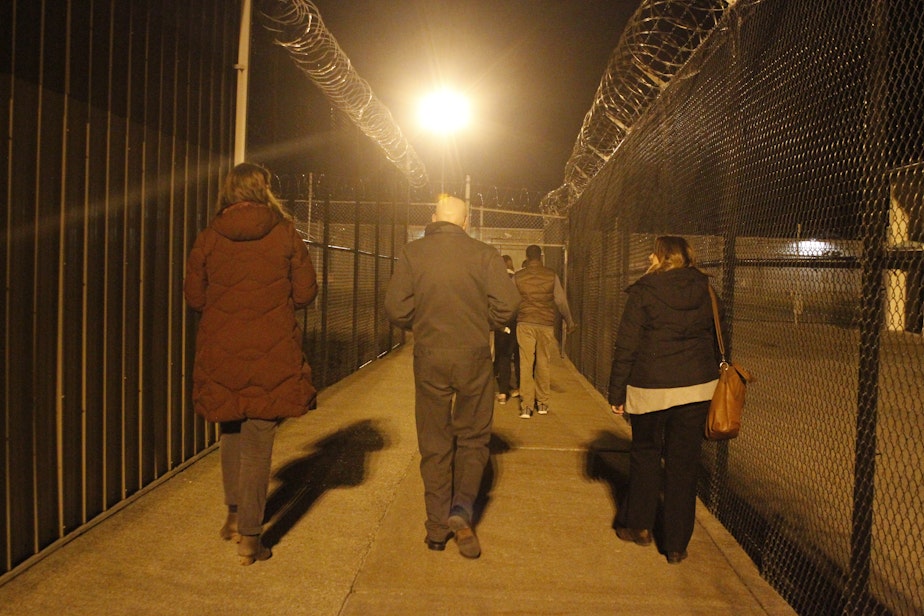The end of the pipeline. Seattle teachers go to prison to get schooled

Every month, a new group of Seattle educators sit down with khaki-clad inmates in a fluorescent-lit, windowless room at the Monroe Correctional Complex.
It’s an effort to address the so-called "school-to-prison pipeline" by meeting face-to-face at its terminus.
On a recent Friday evening, the group included teachers-in-training from the Seattle Teacher Residency, who have committed to working in low-income schools for five years upon getting their master's degrees.
The inmates are members of the Black Prisoners Caucus, an organization focused on social justice inside and outside of prison.
After introductions and a ceremony featuring a sculpture of a sankofa bird — a Ghanaian symbol of reaching back to the past to bring value to the present — the participants break into small discussion groups. Each month, caucus members draw up the topics: questions for the inmates to ask the teachers, and vice-versa.
"Do you see racism in the curriculum a lot?" an inmate named Tank asked the teacher-trainees in his group. (The prison requested we use inmates’ first names only.)
Sponsored
"Because in my time, you know, we didn't see ourselves in the curriculum," Tank said. "We didn't see ourselves on the walls being celebrated for our intelligence."
He continued: "I kind of knew some of these things, and so I would actually speak to some of that, and that would be considered too challenging to the teacher.”
Teacher-in-training Maria Davis said that’s still a problem.
"Going through the curriculum that the school district has given us at this point, there are kids who are not ever going to see themselves represented in it," Davis said. "There are efforts to make it more representative of everyone in the classroom – but it’s lacking, for sure."

Sponsored
Another question the inmates asked each other: What made them feel relevant – or irrelevant – in school?
Many of the men said they felt like part of the school when teachers got to know them as people – and focused on their strengths.
An inmate named Brandon fondly remembered Ms. Sarver, his fourth- and fifth-grade teacher at Lake Dolloff Elementary in Auburn.
"One thing that she did with me is she saw my great-aunt interacting with me, and she mirrored that. That was really profound to me. She would talk to me a little bit louder, a little bit rougher. And she did out of love."
Other teachers, Brandon said, could make him feel invisible.
"What made me feel irrelevant was when I’d raise my hand, I was really enthusiastic, and they didn’t call on me. After so long of that, I just stopped raising my hand."
Sponsored
Many inmates said they only felt noticed when they did something wrong — while they saw white students get away with far worse.
A baby-faced inmate named Tony said, as a black boy, doing the right thing wasn't always enough, and school staff could misconstrue his intent. He recalled almost getting into a fight, but walking away instead. He went to the principal's office visibly upset.
"The vice principal had security in there, and she threatened me. She said to get that look off my face before I end up on the ground," he said. Tony said he was arrested for intimidating a school official, and expelled.

Mark Perry, the principal of Nova, an alternative high school in Seattle’s Central District, is started bringing fellow educators up to the prison eight years ago on the first and fifth Fridays of the month: beginning teachers, long-time teachers and administrators — even school board members.
"It’s what I usually call a touchstone opportunity, where we get out of our own reality, and we actually see the consequences of the work we do when it doesn't happen in a way that's positive for students," Perry said.
Sponsored
Teachers’ time with students is usually fleeting, Perry said — and, for the mostly-white teaching corps, the “school-to-prison pipeline” can feel theoretical.
"We don’t see the end of the pipeline. And by going up to Monroe, they not only see the end of the pipeline, but they hear the stories from the men up there."
How they may have dropped out in the fifth grade, Perry said.
About teachers who didn't take the time to get to know them.
Or teachers who put them in special education in third grade just because they were done with their work and walking around the room.
Sponsored
Perry said it’s a way to confront decades-old gaps between outcomes for white and black children in Seattle Public Schools.
It also has personal significance.
"I was incarcerated in the '70s," Perry said. "I thought I understood something about race and racism. What he realized upon landing in San Quentin, he said, "is that most of what I understood was intellectual."
It's one thing for educators to read up on racism, Perry said. "We also have to understand it more deeply, so that when things happen, we can begin to ask questions. We can begin to confront it, and confront each other."
Perry was instrumental in making trips to the prison part of the curriculum for beginning teachers in the Seattle Teacher Residency.
These field trips stay with participants.
Several weeks after the prison visit, beginning teacher Mitch Ahmann said that was his first time in a prison.
Ahmann said he’ll never look at people who’ve been incarcerated – or his students – the same way again.
He said it's made him especially conscientious about the ways he and his fellow educators approach their elementary students.
"I’m hyper-focused on it, and watching which kids we’re pushing out, and watching which kids are constantly being disciplined in a certain way, and thinking about how our school thinks about discipline," Ahmann said.
Ahmann said he's rethinking his tactic of sending kids out of the classroom to help them calm down. "It could be perpetuating this negative self-learning thing that could eventually push them out."
"I'm like - 'oh my gosh, I just failed this kid,' on, like, a micro level, but it feels now it's so impactful, right?"
Back at Monroe, Tony said this is the sort of realization he wants teachers to come away with: The power they hold to shape the way children think of themselves, each other, and their place in society.
"My biggest thing is to help prevent the next generation from making these same choices, these same destructive lifestyles, and to create positive change," Tony said. "I just want to make the world a better place.”
He doesn't want any more kids to end up in prison the way he did — when he was just sixteen.




